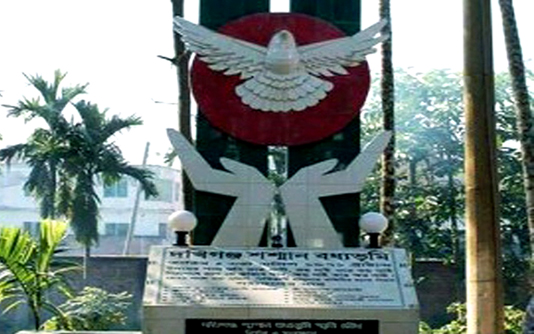By Mamun Islam
RANGPUR, March 14, 2020 (BSS) – Getting frightened witnessing curfew-
breaking massive processions of the Bangalees in Rangpur on March 3 in 1971,
the Pakistani occupation army and their non-Bengali Behari collaborators here
started genocide.
Former District Muktijoddha Commander Mosaddek Hossain Bablu said the
occupation forces started planning for cleansing the innocent Bangalees,
including intellectuals, of Rangpur city that turned volatile since the
beginning of March.
“As soon as hatred Pakistani President Yahiya Khan on March 1 cancelled the
scheduled parliament session on March 3, 1971 and declared a curfew on the
day, the city of Rangpur turned explosive,” Bablu said.
Father of the Nation Bangabandhu Sheikh Mujibur Rahman vehemently rejected
cancellation of the scheduled parliament session and called strike on March 2
in Dhaka and March 3 throughout the country.
Under extremely volatile situations, the local student leaders gathered at
a meeting at ‘Panga House’ in the city on March 2 and chalked out next
strategies with Chhatra League leader Rafikul Islam Golap in the chair.
Accordingly, thousands of people brought out massive protest processions on
the city streets here as per Bangabandhu’s call breaking curfew on March 3
when the nation was in unprecedented non- cooperation movements against the
Pakistani regime.
“Around 9 am, school student Sangku, 12, of Guptapara area, came out
without taking breakfast along with his elder brother Kumaresh Samajhder Babu
and participated in the non-cooperation movement rally,” Bablu said.
At one stage, non-Bengali Behari Sarforaz Khan opened gunfire from his
house in Alamnagar area at Sangku who succumbed to his injuries on way to
hospital at 9:30 am.
“The news of Sangku’s martyrdom instantly turned every Bangalee extremely
angry when thousands of them participated in the massive processions
sparkling the War of Liberation for the ultimate struggles for independence,”
Bablu added.
On that day, college student Abul Kalam Azad and government employee Omar
Ali also embraced martyrdoms here in the hands of the Pakistani army and
their collaborator non-Bengali Beharis.
Former Treasurer of Begum Rokeya University Professor Mozammel Haque said
the Pakistani hyenas with their non-Bengali Behari collaborators, caught 11
brilliant Bangalees in a pre-planned manner on March 27, 1971 from their
houses in the city.
Later in the small hours of April 4, the Pakistani blood-hungry occupation
forces with their local collaborators took them to Dakhiganj Shwashan
(crematory) in the city and gunned them down to make the Bengali nation
talentless.
Luckily, one of them Awami League leader Dr. Dinesh Chandra Bhowmick alias
Mantu Daktar, who received severe injuries, escaped death and later, joined
the Mukti Bahini after getting proper treatments in neighbouring India.
Talking to BSS, General Secretary of district unit of Ghatok Dalal Nirmul
Committee Moazzem Hossain Lablu said the occupation forces killed the ten
intellectuals on April 4, 1971 to make Rangpur talentless.
Being organised, some 30,000 Bangalees irrespective of caste, creed and
religion, attempted to capture Rangpur Cantonment on March 28, 1971 when 600
of them were gunned down by the Pakistani army at Nishbetganj area igniting
the War of Liberation.
“The killing of three brave sons on March 3, ten intellectuals on April 4
and 600 Bangalees on March 28 ignited heroism in every Rangpur people to
launch stiff resistance against the Pakistani occupation forces,” Lablu said.
Freedom fighter Akbor Hossain said the occupation forces with their non-
Bengali Behari collaborators continued conducting massacres of hundreds of
innocent Bangalees in Rangpur since March in 1971.
“Martyrdom of three brave sons, ten intellectuals and 600 innocent
Bangalees inspired the Bangalees in joining the Mukti Bahini en-masse to
ultimately snatch away the ultimate national independence on December 16,
1971,” Hossain added.



